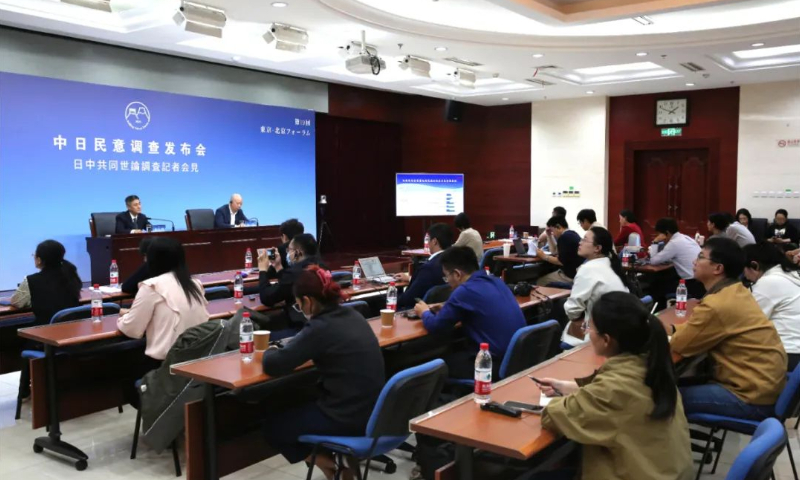Most Chinese and Japanese respondents acknowledge the importance of bilateral relationship: survey

Photo: WeChat account of China Foreign Languages Publishing Administration
A latest survey of public opinion on China-Japan relations released simultaneously in China and Japan on Tuesday shows most Chinese and Japanese respondents acknowledge the importance of the relationship between the two countries. The respondents also exhibit both notable similarities and distinct differences in their choices in terms of the major factors that influence bilateral relations.
The survey result was released by China Foreign Languages Publishing Administration and the Japanese nongovernmental organization Genron NPO at the 19th Beijing-Tokyo Forum held online in Beijing, China, and Tokyo, Japan.
Gao Anming, deputy director and editor-in-chief of China Foreign Languages Publishing Administration, introduced the data, basic details and the main findings of the survey from the Chinese side while Yasushi Kudo, representative from Genron NPO, introduced the major findings from the Japanese side.
The survey results indicate that respondents from both China and Japan acknowledge the significance of China-Japan relations. They highly expect for the future improvement and development of bilateral relations, as well as the promotion of regional peace and prosperity.
Respondents from both countries express a desire for a peaceful, stable and developing international environment. They hope that China and Japan, while supporting and promoting economic and trade cooperation, engaging in cultural exchanges and maintaining strategic autonomy, can collaborate in addressing regional and global challenges, jointly constructing a constructive and stable China-Japan relationship that aligns with the requirements of the new era.
The data shows that 60.1 percent Chinese and 65.1 percent Japanese respondents acknowledge the importance of the relationship between the two countries, with the major reasons given including China and Japan "being important neighbors and major trading partners," "playing a crucial role in regional peace and development" and their "highly interdependent economies and industries."
However, in terms of the current state of bilateral relations, 41.2 percent of Chinese respondents and 68.4 percent of Japanese respondents believe that the relationship between the two countries is not good.
In terms of the factor that hinders the development of bilateral relations, the choice with the biggest proportion from both countries is "territorial disputes" with 39.5 percent Chinese and 43.6 percent Japanese respondents.
Other major options chosen by Chinese respondents are relatively concentrated on issues such as economic frictions, with 28.6 percent thinking trade disputes, technology transfer and intellectual property hinder the development of bilateral relations. Another 28.2 percent choose disputes over maritime resources, 21.3 percent choose Japan's teaming up with the US to militarily contain China, and 19.2 percent choose the lack of political mutual trust between governments of both sides.
Other major options chosen by Japanese respondents are relatively concentrated on issues like the issue of discharging contaminated wastewater from the Fukushima Daiichi Nuclear Power Station into the sea, with 36.7 percent choosing it. Another 28.2 percent pointed to the lack of political mutual trust between the governments.
On August 24, 2023, the Japanese government and Tokyo Electric Power Company (TEPCO) officially initiated the discharge of nuclear-contaminated wastewater from the Fukushima Daiichi nuclear power plant into the ocean. Respondents' attitudes toward this issue from both countries present a complex situation.
A considerable proportion of respondents from both countries express concerns, while another segment of respondents from both sides mentioned "unable to assess at the current stage."
On the credibility of the International Atomic Energy Agency's (IAEA) review report on the ocean discharge plan and the appropriateness of Japan's ocean discharge actions, many Chinese respondents believe "regardless of the IAEA's review results, nuclear-contaminated wastewater should not be discharged into the ocean," while some claim "the review results of the IAEA can be trusted, but the Japanese government should make further efforts to eliminate international distrust."
The Japanese respondents' choices are more concentrated on the latter, believing that the Japanese government still needs to make efforts to eliminate distrust. Only 25.2 percent of Japanese respondents expressed a positive attitude toward the credibility of the IAEA review results and the appropriateness of the ocean discharge behavior.
Besides, the Chinese and Japanese respondents agree on the significant role of economic factors in the bilateral relationship, and they also have high prospects for future economic and trade cooperation between China and Japan.
Meanwhile, Chinese and Japanese respondents expressed concerns about the negative impact that China-US relations have on China-Japan relations. Japanese respondents, in particular, urged their government to launch a balanced and neutral foreign policy for their country.
The construction of China-Japan cooperative relations in the new era is increasingly widely recognized by respondents from both countries. Chinese and Japanese respondents share consistent views on jointly shouldering the responsibility of maintaining regional peace and development, enhancing coordination and cooperation in international affairs and endeavoring in addressing global challenges.
Moreover, Chinese and Japanese respondents highly recognize the significance of people-to-people exchanges. The domestic news media remains the primary source for respondents from both countries to obtain information about each other and the China-Japanese relations.
According to the survey, Chinese and Japanese respondents hold high expectations for promoting peaceful and friendly development of bilateral relations based on the spirit of the Sino-Japanese Treaty of Peace and Friendship.
Since the Beijing-Tokyo Forum was initiated in 2005, the public opinion survey on China-Japan relations, as an important part of the forum, has been conducted 18 times in a row. It has become an important reference reflecting the public opinions of the two countries and enhancing mutual understanding.
Photos
Related Stories
- Awards ceremony of China-themed photography competition held in Tokyo
- Name-list of military doctors from Japanese germ-warfare unit made public
- China firmly opposes Japan's unilateral move of nuclear-contaminated water ocean discharge
- Chinese official slams Japan's nuke wastewater dumping
- China's move to suspend imports of Japanese aquatic products justified, reasonable, necessary: commerce ministry
- 92nd anniversary of September 18 Incident commemorated in China
Copyright © 2023 People's Daily Online. All Rights Reserved.









